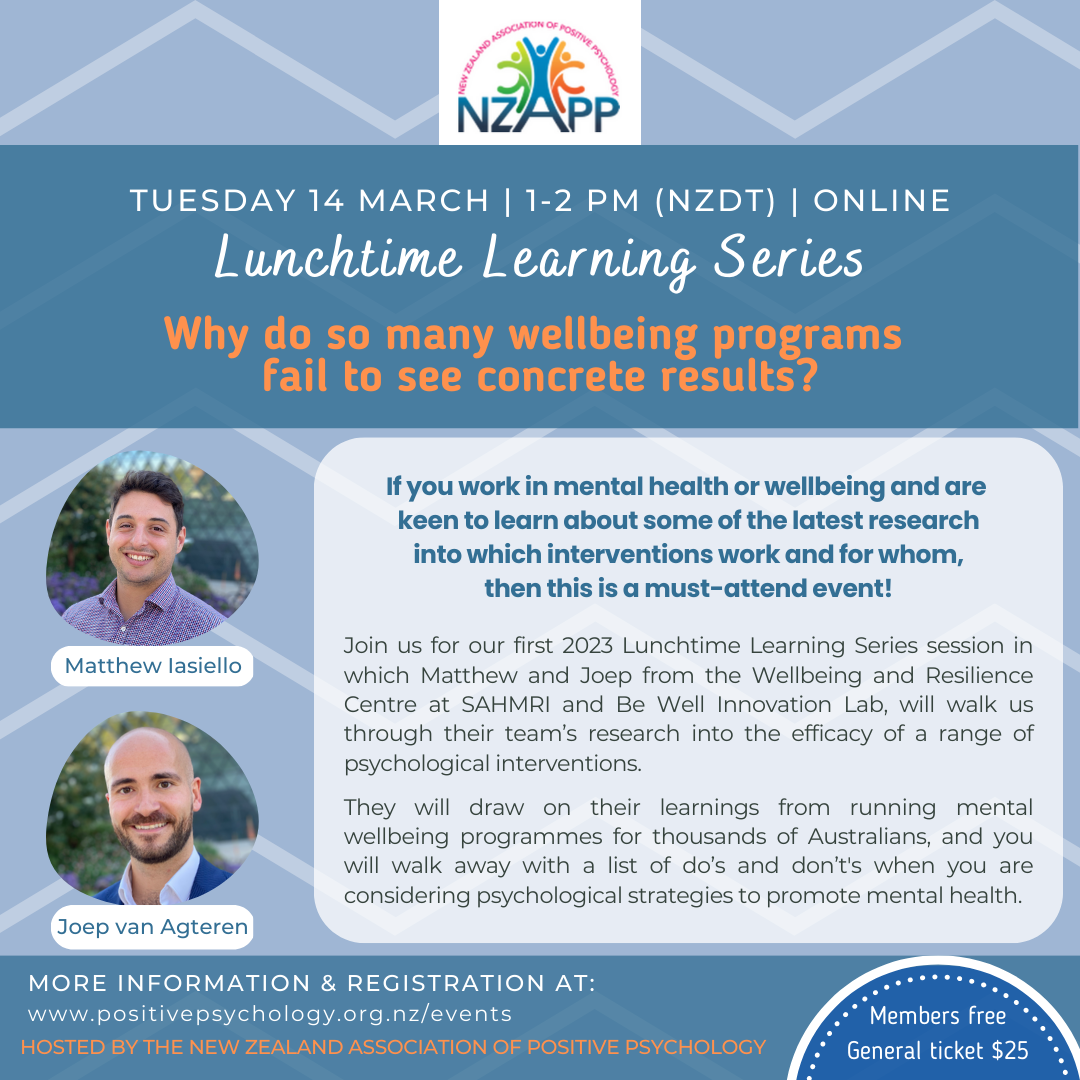Join us for the upcoming virtual Lunchtime Learning Session: Why do so many wellbeing programs fail to see concrete results?
While scientific evidence indicates mental wellbeing can be reliably supported by a number of psychological interventions, the impact and utility of interventions depends on various factors that researchers and practitioners need to take into account. This presentation will firstly discuss the findings from a large systematic review and meta-analysis (419 randomised controlled trials, 53,288 participants) showing the efficacy of a range of psychological interventions. It will furthermore show how various moderators can influence the impact of interventions across clinical and non-clinical populations. Matthew Iasiello and Joep van Agteren will draw on their learnings from running mental wellbeing programs to thousands of Australians and at the end of the session, you will walk away with a list of do’s and don’ts when you are considering engaging with or implementing psychological strategies to promote mental health.
There will be an opportunity to ask questions after the presentation.

About Matthew Iasiello
Since 2015, Matthew has been working on the development and dissemination of mental wellbeing interventions across the Australian community at the South Australian Health and Medical Research Institute (SAHMRI). Matthew's PhD research was designed specifically to strengthen the translational work conducted by SAHMRI, and to solve problems that represented gaps in the literature that were arising when delivering mental wellbeing interventions into the community. The impact and relevance of Matthew's work has been demonstrated with invited presentations at international academic conferences, and multiple media stories with significant online engagements.
Matthew's research investigates the dual-continua model, an innovative model of mental health which suggests mental illness and mental wellbeing reflect distinct continua, rather than the extreme ends of a single spectrum. This novel conceptualisation of the relationship between mental illness and mental wellbeing has significant implications in the way we promote mental health, and prevent, treat, and recover from mental illness. However, little is known about the evidence validating the model and whether this evidence supports the implications that have been proposed in the literature. Matthew's PhD project synthesises the relevant evidence supporting the model, provides further evidence of the role of mental wellbeing in the recovery of mental illness, and addresses important limitations in the current assessment of mental wellbeing in the context of psychological distress and mental illness.
Matthew is engaged in the development of mental wellbeing services and products that emerge directly from the new knowledge generated from his PhD, translated into the community via SAHMRI. This has resulted in the development and evaluation of the Be Well Plan, and evidence-based wellbeing intervention (over 5,000 participants since 2020), and the Be Well Tracker, a free online assessment platform that Australians can use to assess and monitor their mental health (20,000 users since 2019).
About Joep van Agteren
Joep van Agteren is the co-lead for the South Australian Health and Medical Research Institute (SAHMRI)’s Be Well Co and is part of the leadership team for the Be Well Lab, a mental health research collaboration between SAHMRI and Flinders University. A research psychologist from background, he specialises in evidence synthesis, wellbeing measurement and intervention design. He has worked with over 30 organisations and government departments and provides consultation to various state governments on the topic of wellbeing and mental health. His work focuses on implementing mental health promotion solutions across diverse population groups, aiming to engage people and organisations in engaging evidence-based wellbeing approaches well before people hit crisis point.